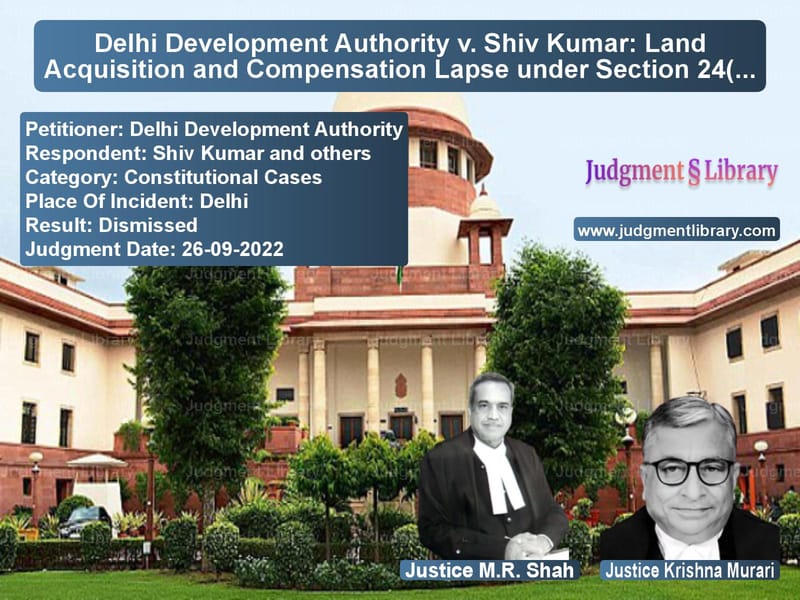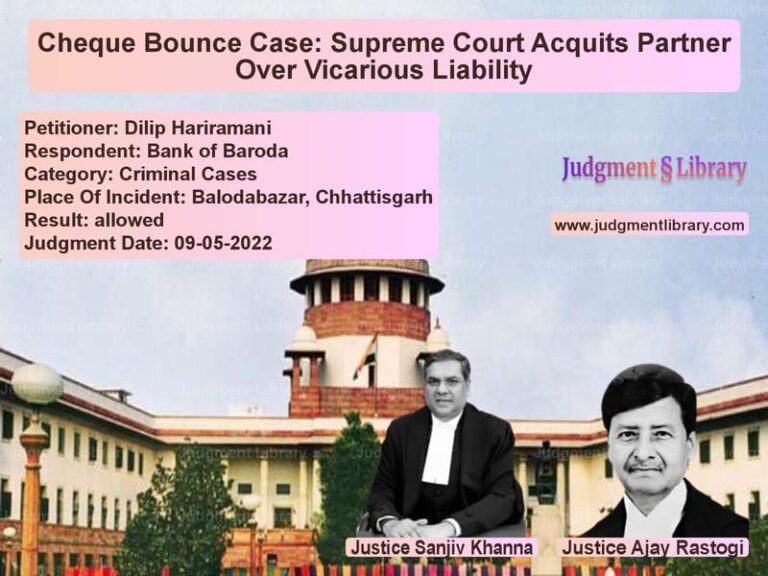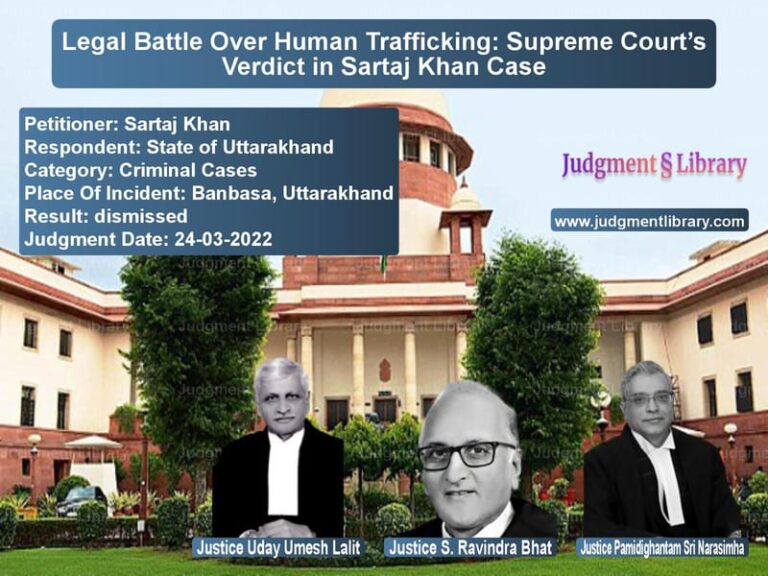Delhi Development Authority v. Shiv Kumar: Land Acquisition and Compensation Lapse under Section 24(2) of the 2013 Act
The case of Delhi Development Authority (DDA) versus Shiv Kumar and Others revolves around the interpretation and application of Section 24(2) of the Right to Fair Compensation and Transparency in Land Acquisition, Rehabilitation and Resettlement Act, 2013 (2013 Act). This provision deals with the lapse of land acquisition proceedings due to non-payment of compensation or non-taking of possession for five years or more, before the commencement of the 2013 Act. The appellant, DDA, challenged the High Court’s decision that declared the acquisition proceedings for certain parcels of land to have lapsed, as the compensation was not paid and possession was not taken in accordance with the provisions of the 2013 Act.
The factual backdrop of the case involves several land acquisition proceedings initiated by the DDA for the development of residential and commercial areas. The acquisition of land was carried out under the Land Acquisition Act, 1894, with notifications issued between 1984 and 1994. The respondents, who were landowners, contended that despite the passage of many years, they had not received compensation for the acquired land, nor had possession been taken by the authorities, as required by law. Consequently, they filed petitions before the High Court of Delhi, invoking Section 24(2) of the 2013 Act, which mandates the lapse of acquisition proceedings in cases where compensation has not been paid and possession has not been taken for five or more years before the Act came into force.
The High Court, in its impugned judgment, held that the land acquisition proceedings for the concerned parcels of land had lapsed due to non-payment of compensation and non-taking of possession by the authorities for the prescribed period of five years. The DDA, along with the Government of NCT of Delhi, filed appeals against this decision in the Supreme Court, asserting that the High Court had wrongly applied Section 24(2) of the 2013 Act, as the acquisition proceedings were valid and compensation had been tendered, albeit not formally deposited in the court.
The appellants, DDA and the Government of NCT of Delhi, argued that the application of Section 24(2) should not be invoked in this case, as compensation had been determined and efforts to deposit the compensation were made. They contended that the provisions of Section 24(2) apply only in cases where there is a complete failure to take possession or pay compensation, and not in cases where compensation has been offered but not accepted. The appellants further argued that the provisions of the 2013 Act, particularly Section 24(2), could not be used to invalidate the land acquisition process that was carried out before the Act’s implementation.
The respondents, however, argued that the non-payment of compensation and non-taking of possession for such a long period of time resulted in the automatic lapse of the acquisition proceedings under the 2013 Act. They contended that the law is clear in its intent to provide compensation to landowners within a reasonable time frame and that the delay in compensation and possession violated the rights of the landowners. The respondents emphasized that the 2013 Act was enacted to ensure fair and transparent compensation for land acquisition and that the authorities should not be allowed to evade the consequences of their inaction.
The legal issue at the heart of this case revolves around the interpretation of Section 24(2) of the 2013 Act and whether it applies to land acquisition proceedings where compensation has not been paid and possession has not been taken for five or more years. The provision provides that if the acquisition has not been completed within the stipulated time frame, the acquisition proceedings shall lapse. However, the law also allows for certain exceptions and conditions, such as when compensation has been deposited or when possession has been taken. The appellant’s counsel argued that the High Court had misinterpreted the law and that the respondents should not be entitled to the benefit of Section 24(2) under these circumstances.
The Supreme Court, upon hearing the arguments, examined the provisions of Section 24(2) of the 2013 Act, as well as the case law on the interpretation of this provision. The Court referred to the Constitution Bench decision in Indore Development Authority v. Manohar Lal, (2020) 8 SCC 129, which had clarified the application of Section 24(2). The Court noted that the lapse of land acquisition proceedings under Section 24(2) applies when there is a failure by the authorities to take possession of the land or pay compensation for a period of five or more years before the commencement of the 2013 Act. The Court also emphasized that the provision aims to protect landowners from prolonged delays in the land acquisition process and to ensure that they receive compensation within a reasonable time.
The Court concluded that the non-payment of compensation and non-taking of possession in this case triggered the application of Section 24(2) of the 2013 Act, leading to the lapse of the acquisition proceedings. The Court noted that the compensation had not been paid and possession had not been taken within the prescribed period, and therefore, the High Court’s judgment declaring the acquisition to have lapsed was correct. The Court further held that the appellants’ argument regarding the tendering of compensation was not sufficient to prevent the lapse of proceedings under Section 24(2), as the compensation had not been deposited as required by law.
Consequently, the Supreme Court dismissed the appeals filed by the DDA and the Government of NCT of Delhi, upholding the High Court’s judgment. The Court directed that the land acquisition proceedings for the concerned parcels of land stand lapsed under Section 24(2) of the 2013 Act, and the landowners should be compensated in accordance with the provisions of the 2013 Act. The Court also emphasized the importance of complying with the statutory requirements for land acquisition and the timely payment of compensation to landowners.
This case serves as a critical reminder of the legal provisions governing land acquisition in India and the rights of landowners under the 2013 Act. The judgment reinforces the importance of ensuring that compensation is paid and possession is taken within the prescribed time frame, and that authorities must act in a timely and transparent manner when acquiring land for public purposes.
Petitioner Name: Delhi Development Authority.Respondent Name: Shiv Kumar and others.Judgment By: Justice M.R. Shah, Justice Krishna Murari.Place Of Incident: Delhi.Judgment Date: 26-09-2022.
Don’t miss out on the full details! Download the complete judgment in PDF format below and gain valuable insights instantly!
Download Judgment: delhi-development-au-vs-shiv-kumar-and-other-supreme-court-of-india-judgment-dated-26-09-2022.pdf
Directly Download Judgment: Directly download this Judgment
See all petitions in Fundamental Rights
See all petitions in Constitution Interpretation
See all petitions in Public Interest Litigation
See all petitions in Separation of Powers
See all petitions in Emergency Provisions
See all petitions in Judgment by Mukeshkumar Rasikbhai Shah
See all petitions in Judgment by Krishna Murari
See all petitions in dismissed
See all petitions in supreme court of India judgments September 2022
See all petitions in 2022 judgments
See all posts in Constitutional Cases Category
See all allowed petitions in Constitutional Cases Category
See all Dismissed petitions in Constitutional Cases Category
See all partially allowed petitions in Constitutional Cases Category







